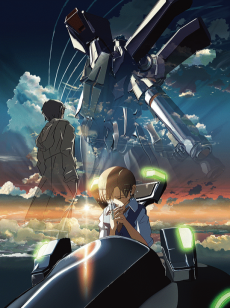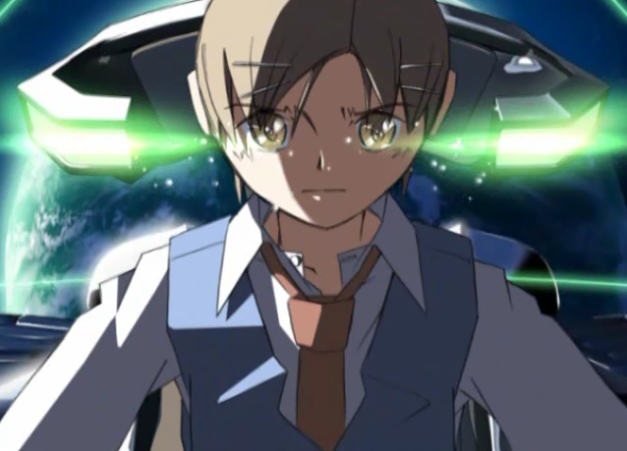
Hoshi no Koe

Type
ANIME
Genres
Drama
Mecha
Romance
Sci-Fi
Popularity
33,250
Status
FINISHED
Aired from
02/02/2002
Aired to
02/02/2002
Episodes
1
Duration
25 minutes
Studios
ADV Films
CoMix Wave
Is licensed
Yes
Source
ORIGINAL
Hoshi no Koe
Synopsis:
It is 2046 when a mysterious alien force begins their annihilation of the human race. Leaving behind the one person she loves, Mikako joins the interstellar battle as a pilot. And so - while Mikako risks her life to save mankind - Noboru waits. At first days, then months, then years for each new message that will let him know whether Mikako is still alive. And, while she barely grows older in t...
4 Reviews about Hoshi no Koe
waifwu
Brilliant heart touching story held back only by low budgetPublished the 3/8/2019, 6:28:56 AM
Updated the 9/25/2023, 10:16:26 PM
Spoiler free review
Pockeyramune919
Despite a short runtime and subpar art, Voices of a Distant Star proves to be a hidden gem.Published the 4/3/2019, 2:29:23 AM
Updated the 1/19/2025, 3:23:28 AM
Voices of a Distant Star is, in a word, ambitious. Makoto Shinkai wrote, directed, and produced the anime in a period of seven months using his Power Mac G4. If that alone wasn’t impressive, he provided half of the voices for the original Japanese audio. The 2002 OVA’s story was ambitious as well: telling a story that spans nearly a decade about two childhood friends who are dragged further and further apart. It’s a story that mixes fantastical mecha elements with a very relatable, slice-of-life romance. The story sounds like it could make for a decent one-cour show, at the shortest. Prepare to pick up your jaw from the floor because Voices of a Distant Star is only twenty-five minutes long. Ambitious indeed.
And, believe it or not, Makoto Shinkai manages to pull off a compelling story despite the short run time. Nagamine Mikako and Terao Noboru are junior high school students and best friends. They are anticipating attending the same high school, but Mikako is soon recruited to serve as a pilot for UN Spacey. She’s deployed and the two are forced to communicate via text messages. As she’s deployed farther and farther from Earth, Noboru must wait longer and longer to receives texts from his friend (I loved this astronomical detail). I was initially worried that the story would end up being either quite dense and confusing or sparse and unfulfilling, but a lot happens in a short time, yet it doesn’t feel like too much. A careful balance is struck; enough is shown to make the story to make it cohesive while, given the runtime, the OVA isn’t bogged down. In hearing their thoughts about the situation they’re in, even if they’re not super fleshed out, you really start to feel for them. Helping out matters is the music which is simple, but moving.

The low point of this anime is definitely the animation and art. Given that this was a solo project, I suppose it couldn’t be helped. Character models often look downright amateurish and at times remind me of something from ctrl-alt-del. Luckily, the art didn’t detract from the experience much, for me, but if subpar art bothers you, I’d take heed. There’s also CGI for the mechs, but it really didn’t seem that out of place. For its faults, the anime still looks pretty modern for 2002.
I didn’t really like how the story started in media res, with Makoto in a school building, only for it to be revealed to be her internal musings, with her in a mech. Yes, it’s shocking, but it’s also confusing and I think it would be better if the story was told chronologically, given how short it is and how necessary it is for the viewer to understand this story. Still, this is a minor nitpick.
Ultimately, there isn’t much to say about Voices of a Distant Star, but that’s more due to its brevity than anything. The things that are said are pretty much all positive. I enjoyed my brief time with this OVA and implore viewers to experience this hidden gem for themselves. It’s only twenty-five minutes, but it certainly leaves an impression for longer.
8/10
B-
pointydelta
By turns elegiac and touching, a deeply human short that lacks polish but bursts at the seams with promise.Published the 9/8/2020, 10:07:18 AM
Updated the 4/18/2023, 5:35:43 PM
Here be spoilers.

How much do you care about the things you care about? How much effort would you put in to them, to get them done or finished, if you really, really had to? How willing are you to go that extra mile, or two, or five? And what kind of self-belief does it take to believe that people will like it when you finish?
With those in mind, it's a damned miracle that any film gets released at all, really. But directors wouldn't be directors if they didn't have a vision. In this short, you can feel the vision of its director straining at the surface to break out. In places, it nearly does. But in most of it, it's hidden by the failings in other areas. What's clear, though, is that this short by Makoto Shinkai has the ideas and the pedigree to be great. But it never stretches beyond being just good.
But maybe that's OK.
"Time is...such a cruel thief." - Story

Shinkai's standard fare of connections and the things that break them is fertile ground for storytelling. This variation on it is particularly clever, because it occupies a world which is, in 2020, retro-futuristic. Whilst the Japanese did use flip phones for a lot longer than we did in the West, the main plot device of flip phones being the only anchor that holds a relationship that hasn't yet had the chance to even come into existence together is a clever one.
Because it's not really about the technology. What it's about is the fact that sometimes there are barriers between us which stop us from saying what we'd like. And that's a properly heartbreaking thing, which Shinkai does his best to capture the absolute quintessence of - and mostly succeeds.
So the story, such as it is, doesn't matter so much. It's about high school lovers, separated by space and eventually by time, linked together by the tiny thread of their messages to the ether. It's a clever if maybe not technically scientific conceit (and certainly one likely at least inspired by Gunbuster), and as the two spiral further and further apart in both space and time Shinkai leverages his setting to provide a set of heart-rending little moments. More on this in a second.
As the movie ends, a nice little insert song by Ai Miyoko starts playing, and Shinkai unveils the very cleverest feat: a typical mecha action scene but devoid of the standard exciting cutting - instead, with big and sweeping camera movements and a voiceover on top from Sumi Mutoh that tones down the volume of the scene. Shinkai, I think, knows that he can't hope to match the production values of a big-budget mecha series, and therefore tries (and succeeds) at something quite different.
"A distance that takes eight years at the speed of light, is no different than saying, 'forever.'" - Art, Backgrounds, and Direction

The good: Makoto Shinkai's strength has always been his art and backgrounds, and he's a very clear eye for a very specific sort of background - not just sky porn, but specifically the sort of imagery designed to be reminiscent of something. Sometimes that's the sky, since everyone's seen it and imagined the sky. But Shinkai's very best backgrounds are the ones that aren't photoreal, as he slides into magical realism. Almost every shot you will see from 5cm per second, say, looks too good to be true. Shinkai's utilisation of animation to give a magical and nostalgic edge to highly realist tracings of real places is tops, and his instinct for and interest in celestial lighting is impressively good.
The bad: Makoto Shinkai is much worse at depicting high technology, a failing that he repeated in The Place Promised..., and which holds him up here badly. Minimal shots of the mechas and the artificial lighting minimise the issue, but when they're used they're really not very good.
The ugly: The character designs. Admittedly, there are only two characters on screen at all, but...they look awful, they go off model a lot, and action animation is bizarrely herky-jerky. Unfortunately...that means that there's a definite slide-showy feel to the movie - understandable for the work of one man, but still an issue.
So...what's the result? Well, Shinkai knows that he's not personally skilled enough to sell character animation convincingly. So it leads to a utilisation of the imagery-barrage style under a voiceover which has since become nearly a trademark. Shinkai is interested in images, and he's very good at picking extremely evocative ones.
"...together?" - Music and Sound

Tenmon's piano score is elegiac and moving, whilst the ED song is well-done, if not as spectacular as the songs of Your Name or 5 Centimeters Per Second (or even Children Who Chase Lost Voices). Sound design, especially in the mecha scenes, is genuinely quite good, although the mixing can be suspect at times. I'm guessing this is mostly intentional, but for the most part it's relatively unimportant.
"I wonder if...you'll forget about me?" - Final Thoughts

This is a really rough draft. And make no mistake, there are lots and lots of rough edges in this short. But there's something undeniably magnetic about Makoto Shinkai's directing, art, and ideas. If there weren't, then they wouldn't make up for the rough edges. And that, I think, is all that you can ask from a short like this one. Potential, some polish, and promise.
It's less than half an hour. Why not give it a spin?

"I am here."
- Pointy